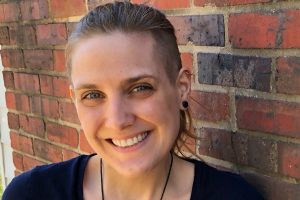
Coming Out as Gay: How to Make the Situation as Easy as Possible
March 25, 2018
Wedding Announcement: Marla Aranda and Melony Burman
March 28, 2018The ways we relate to food are different for everyone. For some, food is a mostly positive experience. For others, cycles of shame and other difficult emotions that accompany eating make food anything but pleasurable.
“Disordered eating” describes a way of eating based on rules and reasons other than hunger and fullness that negatively impacts physical and/or mental health. Disordered eating affects people from all ages and backgrounds—it does not discriminate. Some providers from various backgrounds are now beginning to approach nutrition, weight, and BMI in a very different way and argue that our current model may not actually produce better long-term health outcomes. One such approach is Health At Every Size, which seeks to end discrimination of larger bodies and brings forth the idea that a person’s health is not determined by weight and that weight itself is not in our control.
Sam Tryon, a registered dietitian (RD) in the Washington, D.C. area who specializes in helping queer and trans clients with eating disorders and body image concerns, sat down with us to share her experience with supporting folks in their journey to discover a better relationship with food and their bodies.
 How did you realize that you wanted to work with people struggling with eating disorders and body image?
How did you realize that you wanted to work with people struggling with eating disorders and body image?
While I was in my grad school nutrition program and dietetic internship, I actually felt pretty lost about what I was going to do when I became a dietitian. I didn’t connect to the idea of telling people to eat fruits, vegetables, and whole grains or to eat a certain number of calories and lose weight. It just didn’t energize me—something felt off. Toward the end of my internship, I spent time with a dietitian in private practice who worked with eating disorders from a non-diet, Health At Every Size approach. I was hooked. If all of the science shows us that dieting doesn’t work and even leads to weight gain, then why are we continuing to tell people to lose weight?
Eating disorders and diets make life very small. You cannot participate in social situations with food. Shame takes over when you “fail” the diet and body size and shape become a way of measuring self-worth. Diets are destined to fail. I get to support people in healing their relationships with food and their body and live their lives with less shame. It’s not a bad gig.
Also, when I talk about this stuff, I get really excited and the volume of my voice gets very loud, so I that makes me pretty sure this is what I am supposed to be doing.
What is the role of the dietitian in helping people with eating disorders and body image concerns?
My overall job is to help people to heal their relationships with food and their body. We make goals together that include eating enough; getting good variety of food; being flexible; and eliminating food rules, judgments, and negative body image thoughts.
Together we take a look at how they are currently eating and help them take steps towards these goals. Most people are surprised to learn that they are not eating enough during the day—this includes people with restrictive eating disorders, such as anorexia nervosa, as well as people who are used to dieting and may emotionally overeat at night. I help clients see what rules they have about “good” vs. “bad” foods, calories, weight, etc. and how challenging these rules will help them live the life they want to live.
For eating disorders, collaborating with a team that includes a therapist, a primary care provider, and a psychiatrist—if needed—is crucial to helping clients find recovery.
How would you say your approach to nutrition differs from other members of the health community?
Unfortunately, much of our medical community, including some dietitians, are still focused on weight loss. Clients are told to eat less and exercise more. They may be given calorie goals or told to get rid of certain foods such as those containing gluten or sugar. I will never talk to clients about calories or portion control or why they “should” eat more vegetables.
The research shows that dieting does not lead to long-term weight loss. In fact, it can lead to weight gain and development of eating disorders. When people let go of food judgments and listen to their body, we see true physical and mental health benefits. This applies to everyone, not only people with eating disorders.
Why should people stop thinking of foods as “good” and “bad”?
Avoiding “bad” foods holds people back from fully participating in life situations. “Being good” means that you can’t have pizza at a party, popcorn at the movies, or a doughnut when a coworker brings in free doughnuts. You watch others enjoy these foods while you feel deprived.⠀
Or, you are “bad” and “cheat.” You shame yourself for eating these foods and begin to devise a plan for how you will “get back on track.” You end up eating past fullness because tomorrow, you will go back to avoiding these foods.
When foods aren’t good or bad, it is easier to listen to your body. Thinking of foods as good and bad leads to restriction, shame, and overeating. I am offering another way.
If there are no rules about food, won’t people just start eating foods that aren’t good for them?
The term “not good for you” makes me cringe a little because it goes back to that good food vs. bad food stuff we talked about. Foods serve different purposes in our lives in terms of how they contribute to our physical and mental health. Cinnamon rolls, for example, have carbohydrates, which are our bodies’ preferred source of energy so, even foods that we are told are not good for us, actually serve a purpose in our body. Plus, cinnamon rolls are delicious.
But back to your question: I assume that you are talking about foods such as fries, pizza, buffalo chicken wings, cake, etc.—the foods that diets tell us to avoid. Well, when people let go of food rules and give themselves permission to eat these foods without judgments, sometimes at first, we do see an increase in the amount of these foods that a person might eat.
Then, as the novelty of being able to have these foods wears off, people are able to listen to their bodies. If you eat only mac and cheese everyday, after a few days, you start to feel kind of crappy. Mac and cheese doesn’t taste as good as it does before. If a person listens to their body, at some point they are going to want something cold or crunchy or a different color, whatever that might be for them. When you know that you can have ice cream tomorrow, it suddenly isn’t necessary to eat the entire container tonight. Nutrition really isn’t as complicated as we make it seem—if we pay attention, our bodies figure it out.
What would you say to clients whose main goal is to lose weight?
This is a tough one. We are told by all sorts of people that if we eat “right” and move in a certain way, all of our bodies will be within a certain range (like, BMI). In truth, our weight is determined by our genetics and our dieting history. We all have a different weight that is healthy for us and once we get there, we cannot healthfully change that weight.
Our bodies have about a 10-pound range where they want to hang out. When we go below that, our bodies freak out and think we are starving. Our bodies slow down our metabolism to use less energy and our brains send us signals that increase appetite, particularly for carbs and sugar since that’s how our brain uses energy. It’s why all the research says that diets don’t work.,
Now, this is a tough thing to accept and very different than the messages we get, so sometimes clients aren’t on board. And, that’s totally OK. I tell them that there are two goals. One is to try and address the concerns such as emotional eating or binge eating. To be able to eat without guilt and keep chips in the house without fear of eating all of them. The other is weight loss and I honestly do not know if the two are compatible. I have no way of knowing what a healthy weight is for that person. What I offer is to help with that first goal regarding the relationship with food. If, at the end of it, the person still wants to lose weight, then that is their decision. It is my job to offer another way, but it is not my place to put my values on other people.
Why is this topic so important within the queer community?
Body image concerns, disordered eating, and eating disorders are rampant in the queer community. The transgender population, in particular, has incredibly high rates of eating disorders. Research shows that as much as 15 percent of transgender individuals have eating disorders compared to 1 to 3 percent of the general population. And this doesn’t even include disordered eating and body image distress that don’t quite meet the diagnostic criteria but still very much affect physical and mental health.
We do not have data on non-binary individuals, but anecdotally I would say that this population is at least as affected as transgender folks. Plus, we know that because of discrimination and other factors, transgender, non-binary, and queer individuals are less likely to seek out medical and mental health resources, so rates are likely even higher than we know.
Where can folks find more information about your practice and resources on disordered eating?
I have a private practice in Silver Spring, Maryland and see clients both in the office and virtually. I am working on groups to address body image that will be available both online and in person. My goal is to create groups specifically for members of the queer community. I am not in network with any insurance companies, but I give clients the paperwork for those who have out of network benefits. I also offer sliding scale fees for trans, non-binary, and gender-variant folks.
I also recently joined the social media world—a little late to the party, I know. I am hoping to reach more people and start conversations that question how we think about body size, weight, nutrition, and gender. You can find me on Instagram and Facebook!
Below are some resources to learn more about Health At Every Size, eating disorders, and why we should stop dieting. There unfortunately aren’t a ton of resources specifically geared toward the queer community, but there are a few of us trying to change that.
Resources
- Sam Tryon, RD
- Trans Folx Fighting Eating Disorders
- thirdwheelED
- Health at Every Size
- Jennifer Rollin, MSW, LCSW-C





